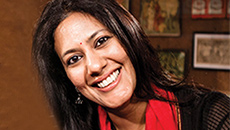For people living in India’s bustling capital city New Delhi, GB (Garstin Bastion) Road is the infamous ‘no-go’ zone reserved for the outcast - sex workers. Home to over 4,000 sex workers and 100 brothels (as estimated by local NGO’s in New Delhi) this red-light zone has been in existence since the British rule and continues to hold on to its dilapidated state. Of course, there are organizations that have extended support by providing free condoms and information sessions about necessary precautions, but the fact remains that there is a serious
absence of rehabilitory measures for sex workers and their children.
Where clearly no one would even volunteer to visit, Gitanjali Babbar, a journalist-turned social worker literally knocked on the doors of these brothels at GB Road to simply talk, laugh and share meals with the sex workers. These meetings, where Gitanjali got to know these women as her elder sisters and their children as her own family, culminated in the establishment of Kat-Katha.
Coming into existence in 2012, Kat-Katha, meaning a tale told by puppets, was co-founded by Gitanjali Babbar and Ritumoni Das, with the aim of empowering and rehabilitating sex workers within the vicinity of GB Road. After completing her two-year fellowship in social work in Rajasthan, Babbar became a health worker at an organization where she was assigned to survey women at brothels and communicate on subjects such as contraceptives, family planning, medications and precautions.
On her assignment, Babbar realized the scope and potential to do more for these women, but due to lack of funds from her organization, she was forced to subdue these ideas. Nonetheless, her ideas came to realization with the establishment of Kat-Katha, which is one of the first of its kind in becoming a channel of faith for sex workers and their children in New Delhi’s GB road environ.
Babbar shares her journey on a platform organized by Moved by Love Retreat, an organization brining together NGOs for change and generosity. She says, “Two didis (elder sisters) were with me and we started a small centre. Somebody [had] donated us that centre and we started our stitching classes. Everyday we used to make new things and we started a batua (wallet) project and they stitched clothes for me and it was so good.”
Upon entering a typical brothel in this area, you will be exposed to the wrecked buildings, gloomy stairways and congested rooms with women exhibited as showpieces. With their painted faces and shiny clothes, these women are forced to sell their bodies and discarded as criminals.
Kat-Katha has taken a step further from the traditional approach of spreading awareness by extending programmes that bring an array of livelihood choices within reach. The organization works to “Reach, Train and Enable.” Women are professionally trained to adapt new skills or hone their existing skills and aspirations in order to become financially independent.
Babbar recalls the first few days of Kat-Katha on Moved by Love Retreat’s stage and says, “The very first brothel where I went [to], I went with one of my friends and they abused us and said, “We don’t want your services, take back your condoms.” They pushed us, said “get out.” I cried a lot [thinking] that I left my job and they don’t understand that I have come here to help them. And then I realized that it will take time to gain their trust, and now I can say that 20 brothels are just like my family.”
Operating from a building in the mouth of GB Road, Kat-Katha serves as a haven for these women who happily engage themselves in various activities such as arts and craft, stitching, dancing and basic education. The premises also double-up into a daytime school for the children of sex workers in the area. Currently, the organization is working to unshackle women shoved in the sex industry by providing them alternate livelihood choices.
The Kat-Katha team along with its determined volunteers has ignited a debate about issues that society always keeps muted. But on the other hand, individuals like Babbar and her team are resolute to break the silence and echo a wave of justice for all.





